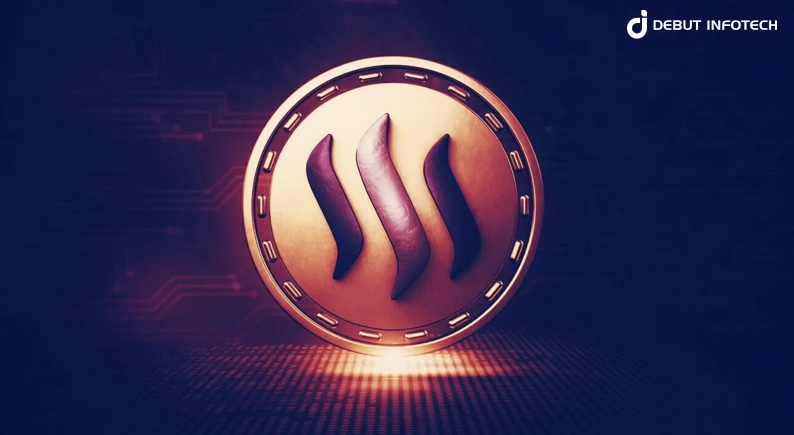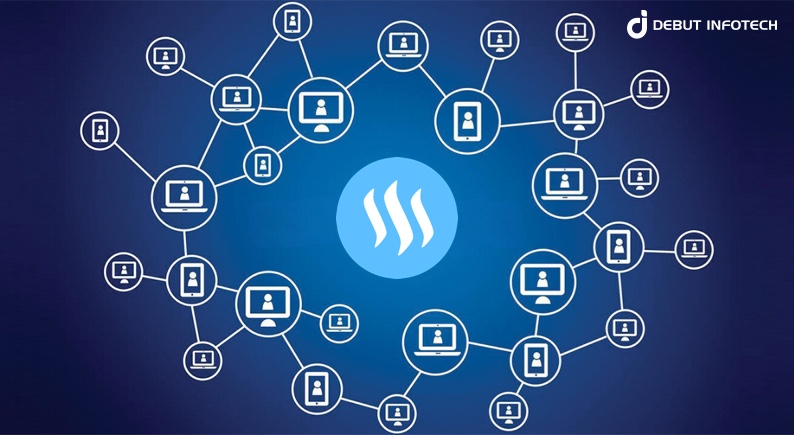Table of Contents
Home / Blog / Blockchain
Steem Blockchain: Pioneering Social Media Through Blockchain Technology
February 12, 2024

February 12, 2024
Otherwise known as the “social blockchain,” Steem blockchain was created from the ground up to power social media and blogging services that use blockchain technology. It is the fundamental technology of well-known applications like Dlive and Steemit.
In contrast to other decentralized payment and social network (DPoS) blockchains, a rewards pool that rewards users for creating and interacting with content on decentralized social networks and decentralized applications (dApps) supported by Steem blockchain receives 75% of freshly made staking rewards. Users who create content and users who regulate and curate material share an equal portion of this rewards pool.
The founders of Steem felt that the platform’s rewards pool model, as opposed to micropayments, tips, or paywalls, which may push users away from paid alternatives and into readers, is more appropriate for decentralized social media. In addition, the Steem blockchain model pays users for creating, endorsing, and discussing content. In addition, you will receive incentives for your skill at content moderation and for finding Steem apps before they become well-known.
What is Steem?

Now we come to the question, what is steem blockchain? Steem is a social blockchain, which is a publicly accessible database that holds immutable material in the form of plain text. Furthermore, as was already noted, it is supported by an internal incentive system that pays content providers and distributors in STEEM, the Steem blockchain token.
One thing to keep in mind is that Steem is a distributed blockchain database that is open to the public and contains all of the records, including text content and transaction data. It is also where reward computations and payouts are carried out. However, a frontend web interface is required, and Steem DApps provide it in order for users and content creators to engage with the Steem Blockchain and view the data on it. Based on the Steem blockchain, Steemit is a social DApp that gives its users Steem token rewards.
The goal of the Steem blockchain’s built-in incentive system is to provide a currency that can appeal to a broader audience, including those who haven’t yet joined any cryptocurrency economy. Let us take a closer look at the Steem Blockchain, starting from how blocks are created.
How The Steem Blockchain Creates A New Block
The Steem blockchain employs a consensus method known as delegated proof of stake, or DPOS, to create blocks. In this scenario, blocks are created by “witnesses” rather than “miners.” Witnesses, in this case, stand for a group of individuals who possess block-creating accounts. Every member of the Steem blockchain community, or those with Steem accounts, has the ability to cast a vote to choose the witnesses. A person’s account can vote for up to 30 witnesses.
The community chose 20 full-time witnesses, and the backup witnesses shared the 21st spot. The network’s block producers and governing body are these 21 witnesses. Every 3 seconds, each witness must provide a new block. As a result, in every 63 seconds, 21 witnesses create 21 blocks. Steem Power is given to the witnesses in exchange for creating each block.
Steem Rewards Distribution System

The Steem blockchain reward system is the most intriguing feature. Steem users who create and curate content, take part in content debates, and cast votes on the content are the ones who receive the rewards. As a return for their contributions, contributing users receive 75% of the annual inflation each year. Although the distribution strategy is based on user voting behaviour, those who interact with the most popular content receive the great majority of incentives.
The more votes you get, the more benefits you get. This kind of crowdsourced curating is seen to be essential for user engagement and network expansion. In the Steem ecosystem, your level of Steem Power (SP) is also crucial, as more SP translates into a larger compensation for upvotes.
Additionally, when a block is created, users receive a portion of the newly created currency, unlike in Bitcoin (BTC), where miners receive 100% of the freshly produced coins in a block. However, with the Steem blockchain, content creators, curators, and holders of Steem Power receive 90% of the newly created STEEM currencies, with only 10% going to the witnesses.
According to the official Steem website, awards of $59,595,935 have been distributed to users as of June 2021.
Why You Should Build On The Steem Blockchain
Content companies and their developers would be thrilled to create apps on the Steem Blockchain for several reasons.
- Given that Steem was created from the bottom up to power web and content apps, it comes with built-in content-specific primitives.
- Businesses can use it for free because it facilitates fee-free transactions that happen almost instantly. They can create engaging social DApps for social interactions and community building without having to develop their blockchain. Additionally, businesses may leverage Steem-powered applications to incentivize users to publish and interact on their platform by providing them with instant free incentives in the form of Steem’s cryptocurrency, STEEM.
- Building on Steem also helps with the problem of acquiring users, which is the most complex and costly aspect of creating and releasing a new program. Instant access to Steem’s one million+ user base, which is expanding rapidly, is granted to DApps on the platform.
Who Benefits From The Steem Blockchain?
The official Steem website caters to social media users, developers, business owners, and hoarders.
Social account users: Through the creation of accounts on Steem-based social apps such as Utopian, DTube, and Steemit, users can interact with the Steem network. Users on these Steem social media apps can earn free Steem coins by producing and curating content. One of the best DApps developed on the Steem blockchain is called Steemit. It’s a website for blogging and social media.
Entrepreneurs: By creating Steem DApps, entrepreneurs in the fields of online content creation, publishing, and community building can make their own reward-based social media network on the Steem Blockchain. Steem’s built-in incentive system assists companies in rewarding users for quality content contributions. This broadens the social app’s appeal and may lead to an increase in user interaction. Because of its unique design, Steem can run real-time applications that enable fee-free, almost instantaneous transactions. More than 324 Steem-based DApps have allowed over a million users to test the blockchain.
HODLers: They can trade—that is, purchase, sell, and earn—Steem tokens. Tokens on Steem come in three varieties:
- A liquid token suitable for short-term traders is STEEM.
- For HODLers, Steem Power (SP) is a vesting token.
- Stablecoin SBD is correlated with USD.
By producing and selecting content, users of social apps built on the Steem blockchain can earn free Steem tokens. Steem account holders can use other cryptocurrencies such as Bitcoin, Bitcoin Cash, Ether, and Dash to purchase all three varieties of Steem tokens from Poloniex. If you don’t have a Steem account, you can buy the tokens from exchanges like Binance, Bittrex and others.
Free Steem Transactions
The Steem blockchain encourages network expansion by utilizing free transactions. The founders of Steem blockchain think that users should be able to interact with and comment on content on a decentralized social media platform without any obstacles. Research indicates that the mere presence of microfees can cause user apprehension and discourage prospective users from participating in blockchain-driven social media networks.
Furthermore, transaction fees on blockchains that allow microchipping—even those with micro fees of less than $0.01—tend to vary, which may eventually make content-tipping impossible. Part of the foundation of steem crypto economics is the knowledge that consumers want cost predictability and that many of them are just used to free services of this kind.
In order to prevent spamming, the Steem blockchain has a bandwidth-limiting mechanism because there are no transaction costs. Each week, users are allowed a certain amount of bandwidth to engage in certain activities, including commenting, replying, and transferring coins; this bandwidth is not used when viewing content. Additional SP gives users access to additional bandwidth.
Build On The Steem Blockchain With Debut
As a blockchain development company enterprise, we at Debut InfoTech enjoy creating apps for the Steem blockchain because of its devoted community of open-source developers. It comes with a whole ecosystem of solid tools, resources, tutorials, and App-based API that makes integrating Steem easier. One can use either a Python or a JavaScript library to construct a Steem project. The following Steem DApp development services are what we can help you with:
- Steem DApp Development: One significant benefit of blockchain-based DApps over centralized apps is that a single entity does not govern its operation. With the tools and knowledge needed to tackle your Steem DApp development project effectively, Debut’s team of blockchain developers is ready to go.
- DApp Design: We provide UI/UX design services and produce user-friendly, straightforward DApp designs to guarantee that your Steem DApp users have the best frontend user experience.
- DApp Testing: We offer comprehensive testing and quality assurance services to guarantee that, prior to launch, your Steem DApp is free of errors and bugs.
Contact Debut InfoTech Steem blockchain developers if you’d like to create an app for your company on the Steem Blockchain. Our developers have extensive expertise in blockchains, including Steem, and can assist you in reaching your goals.
Talk With Our Expert
Our Latest Insights
USA
2102 Linden LN, Palatine, IL 60067
+1-703-537-5009
[email protected]
UK
Debut Infotech Pvt Ltd
7 Pound Close, Yarnton, Oxfordshire, OX51QG
+44-770-304-0079
[email protected]
Canada
Debut Infotech Pvt Ltd
326 Parkvale Drive, Kitchener, ON N2R1Y7
+1-703-537-5009
[email protected]
INDIA
Debut Infotech Pvt Ltd
C-204, Ground floor, Industrial Area Phase 8B, Mohali, PB 160055
9888402396
[email protected]




Leave a Comment